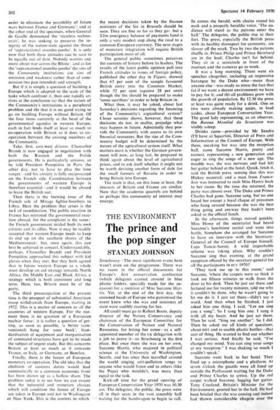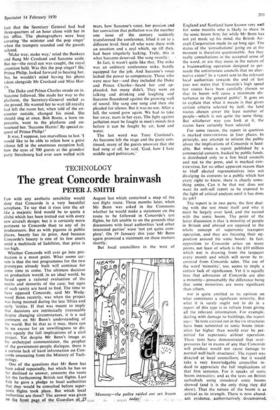THE ENVIRONMENT
The prince and the pop singer
STANLEY JOHNSON
Strasbourg—The most significant event here wasn't even on the programme. There was no room in the official documents for Europe's first conservation conference (which delegates carried around in blue plastic folders, specially made for the oc- casion) for a mention of Miss Suzanne Har- ris. 'Yet, at the end of the first day, the crowned heads of Europe who patronised the event knew who she was and ministers of state were audibly rooting for her.
All credit must go to Robert Boote, deputy director of the Nature Conservancy and chairman of the European Committee for the Conservation of Nature and Natural Resources, for letting her come—as a self- appointed member of the UK delegation with a job to prove it—to Strasbourg in the first place. But once there she was on her own, Suzanne Harris, who majored in political science at the University of Washington, Seattle, and has since then travelled around the world singing anti-pollution songs to anyone who would listen and to others (like the Pope) who wouldn't, was more than equal to the task.
Kick-off time for the grand opening of European Conservation Year 1970 was 10.30 am. The delegates, the public, the press were all in their seats in the vast assembly hall waiting for the bandwagon to begin to roll. In comes the herald, with chains round his neck and a properly heraldic voice. 'The au- dience will stand as the patrons enter the hall.' The delegates, the public rise to their feet. The press, especially the British press with its healthy disrespect for ceremony, are slower off the mark. Two by two the patrons shuffle in. Prince Philip and Prince Bernhard are in the lead; Charles isn't far behind. They sit in a semicircle in front of the rostrum and the cameras go to work.
It was a long morning. There were six speeches altogether, including an impressive harangue by the Duke who—more than anyone else—was ready to stress the fact that (a) if we want a decent environment we have to pay for it; and (b) all problems grow with the growth of population. By 12.30 the press at least was quite ready for a drink. One or two were already making quips, in loud asides, about European Conversation Year. The good lady representing, as an observer, the Bureau Mondial du Scoutisme was visibly asleep.
Drinks came—provided by Mr Sandro (I'll have a) Squartini, Director of Press and Information at the Council of Europe. With them, sneaking her way into the reception hall, came Suzanne Harris, pretty and earnest, representing a new generation and eager to sing the songs of a new age. The trouble was, she was nervous and had left her guitar behind at the hotel. Quick, fetch it, said the British press, sensing that this was Hickey material; and a man from France- Soir was instructed to rush Miss Harris back to her room. By the time she returned, the party was almost over. The Duke and Prince Charles had gone. Suzanne sang, but no one heard her except a loyal claque of pressmen who hung around because she was the best thing going and anyway they hadn't been asked to the official lunch.
In the afternoon, things moved quickly. Miss Howe of the secretariat had heard Suzanne's lunchtime recital and went into battle. Somehow she arranged for Suzanne to have an interview with the Secretary- General of the Council of Europe himself, Lujo Toncic-Sorinj. A wild improbable scheme was taking place. Why couldn't Suzanne sing that evening, at the grand reception offered by the secretary-general for all the participants in ECY 1970?
'They took me up to this room,' said Suzanne, 'where the carpets were so thick it took me fifteen minutes to walk from the door to his desk. Then he just sat there and lectured me for twenty minutes, told me why it couldn't be done, why he wasn't going to let me do it. I just sat there—didn't say a word. And then when he finished, I just asked him one thing. I said, "Let me sing you a song". So I sang him one. I sang it with all my heart. And he just sat there. Then he said, "Sing me another". So I did. Then he asked me all kinds of questions, about DDT and re-usable plastic bottles—that sort of thing. He wanted to find out whether I was serious. And finally he said, "I've changed my mind. You can sing your songs at my reception." I was shaking so much I couldn't speak.'
Suzanne went back to her hotel. They fixed up a microphone and a platform At seven o'clock the guards were all lined up outside the Parliament waiting for the Duke and Prince Charles to arrive. Up the red carpet walked Suzanne, lugging her guitar. Tony CrOsland, Britain's Minister for the Environment, greeted her in the hall. He had been briefed that she was coming and indeed had •shown considerable chagrin over the
fact that the Secretary General had had three-quarters of an hour alone with her in his office. The photographers were busy covering 'the minister and the, pop singer' when the trumpets sounded and the guards saluted.
'Make way, make way,' cried the flunkeys and flung Mr Crosland and Suzanne aside. But no—the royal eye was caught, the royal attention held. Was this the pop singer? He,. Prince Philip, looked forward to hearing her. No, he wouldn't mind having his photo taken alongside Mr Crosland and Miss Har- ris.
The Duke and Prince Charles strode on in. Suzanne followed. She made her way to the platform, the Secretary-General smiled as she passed. He wanted her to wait till royalty had left the room but, when told of the en- counter outside, changed his mind. She should sing at once. Bob Boote, a born im- presario, went to the platform and an- nounced her. 'Suzanne Harris! By special re- quest of Prince Philip!'
It was, I suppose, too marvellous to last. 'I would like to be able to relate how a great silence fell in the enormous reception hall, how the eyes of 700 guests at the grandest party Strasbourg had ever seen welled with
tears, how Suzanne's voice, her passion-and her conviction that pollution was the number one issue of the century suddenly transformed the conference, lifted it on to a different level. fired all who were there with an emotion and a zeal which, up till then, had been singularly lacking. Truly, this is what Suzanne deserved. She sang sweetly: In fact, it wasn't quite like that. The mike was an ordinary conference mike, hardly equipped for the job. And Suzanne's voice lacked the power to compensate. Those who were near her—and they included the Duke and Prince Charles—heard her and ap- plauded, but many didn't. They went on talking and drinking and laughing and -Suzanne floundered against the growing wall of sound. She sang one song and then she pleaded for silence. But it was no use. After a lull, the sound grew again. We had to take her away, tears in her eyes. The fight against pollution must be fought in men's minds first before it can be fought by air, land and water.
The last word was Tony Crosland's. As Suzanne left the stage and the party con- tinued, many of the guests unaware that she had sung at all, he said, 'God, how I hate middle aged politicians.'



































 Previous page
Previous page